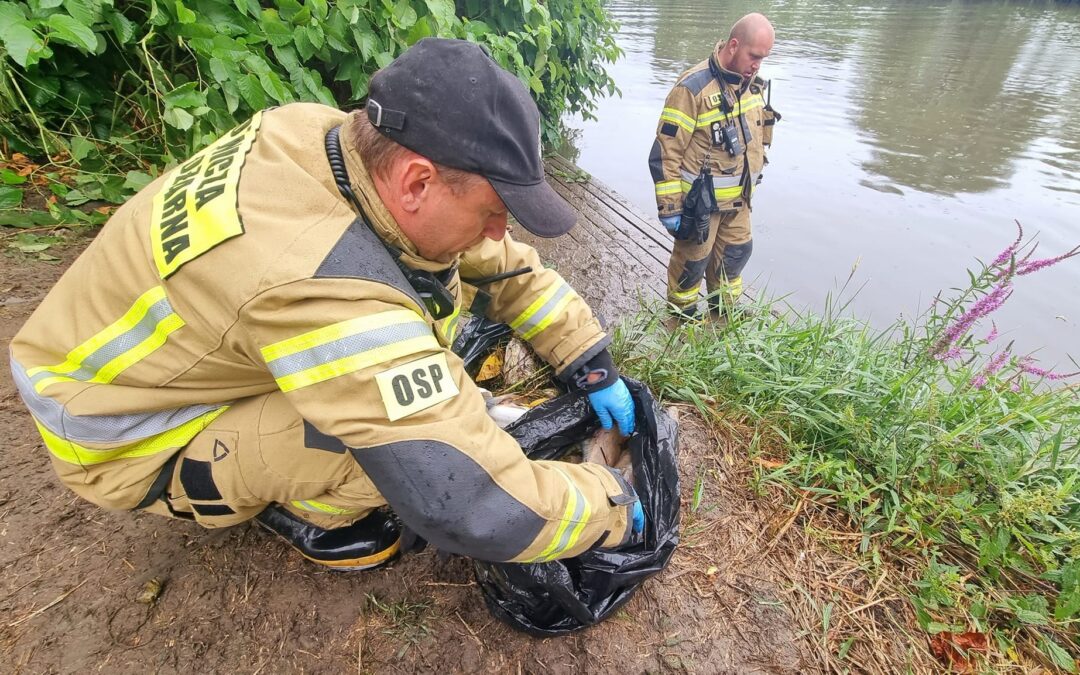The Polish and Czech authorities have set up dams to stop dead fish found in the Czech Republic from flowing down the Oder river into Poland. Over one tonne of dead fish have been retrieved from the river in less than 24 hours.
The event is reminiscent of last summer’s environmental disaster in which an estimated half of the Oder’s fish population died following poisoning caused by the toxin-producing Prymnesium parvum, so-called “golden algae”.
An EU report found industrial pollution in Poland to have been a “key factor” in causing last year’s crisis. However, the Czech Republic is upstream from Poland. The Oder also subsequently flows along the border with Germany.
Germany says Poland is not doing enough to protect the Oder after a new report found that over half the river's fish died off due to last year’s environmental disaster.
But a Polish government official says Germany is spreading disinformation https://t.co/gOQ0HReJvN
— Notes from Poland 🇵🇱 (@notesfrompoland) June 29, 2023
Dead fish flowing into Poland from the Czech Republic were spotted for the first time yesterday in the border town of Chałupki at around 11 a.m. by employees of Polish Waters, the governmental agency responsible for water management.
“The source of fish die-off is not located in Poland,” said the agency in a statement, adding the Czech authorities had been notified. In a call with Poland’s climate minister, Anna Moskwa, her Czech counterpart, Petr Hladík, “confirmed fish die-offs in the Oder on the Czech side near the border”.
“The minister said that services went to the site to take samples for analysis,” tweeted Moskwa. “We are in contact. We will be informed of the results of the tests and the current situation.”
The Polish authorities – which note that the Oder is already undergoing regular testing for the presence of golden algae – have also taken fish and water samples for analysis.
This morning, Jarosław Wieczorek, the governor of the Polish province where the border, confirmed that such algae have not been found “in water samples at two sampling points” on the Polish side. Wieczorek said he hoped that the Czechs would also carry out similar tests.
“Further investigations are being carried out – of the water and of the dead fish,” said the governor, adding that so far more than 1,100 kilograms of have been fished out of the river.
Ponad 1000 kg śniętej ryby do tej pory nasze służby wyciągnęły z rzeki Odry. Ze strony czeskiej nadal napływają jednostkowe okazy.
Co ważne, w próbkach wody z Odry po polskiej strony nie stwierdzono złotej algi. pic.twitter.com/DGxJJxS56K
— Jarosław Wieczorek 🇵🇱 #ŚLĄSKIE (@WojewodaSlaski) July 27, 2023
Last year up to 1,000 tonnes of fish died in the river as a result of the presence golden algae, while other animals, including mussels and snails, were “also severely decimated,” found a German report published last month.
It estaimated that the losses – much higher than earlier estimates of 360 tonnes – saw fish stocks decline between 53% and 67% in various parts of the river. For some fish species, losses were between 86% and 100%.
Germany has accused Poland of not doing enough to protect the Oder. However, the Polish government has called such accusations “fake news” and noted that they have put in a number of measures to monitor and protect the river.

Notes from Poland is run by a small editorial team and published by an independent, non-profit foundation that is funded through donations from our readers. We cannot do what we do without your support.
Main image credit: Odra/gov.pl (under CC BY-NC-ND 3.0 PL)

Alicja Ptak is deputy editor-in-chief of Notes from Poland and a multimedia journalist. She has written for Clean Energy Wire and The Times, and she hosts her own podcast, The Warsaw Wire, on Poland’s economy and energy sector. She previously worked for Reuters.



















